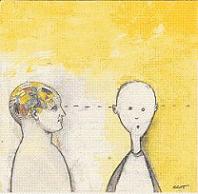Penetrating the Narcissist Disguise
 How is it possible to maximize one's chances of penetrating the almost impenetrable disguises of the character disordered? And how do we keep ourselves from falling into the web of their deceitful scheming?
How is it possible to maximize one's chances of penetrating the almost impenetrable disguises of the character disordered? And how do we keep ourselves from falling into the web of their deceitful scheming?First, it is a mistake to decide never to trust another human being. There are many honest persons who are entirely trustworthy. But there is a difference between trusting another and trusting in another. We ought not to forget that every man is fundamentally a man: "It is better to take refuge in the Lord than to trust in man. It is better to take refuge in the Lord than to trust in princes" (Ps 118, 8-9).
We should also learn to cultivate a kind of "spiritual Kantianism"; for it was the German philosopher Immanuel Kant who distinguished between phenomenon (appearance, or the world as it appears to us) and noumenon (the thing in itself, insofar as it is not an object of our sensible intuition). This distinction may not be sound epistemology, for it led ultimately to Idealism and Post-Modernism, but we should nonetheless understand that things are not always as they appear to be. Evil is brilliantly inconspicuous: "There is a wickedness which is unscrupulous but nonetheless dishonest, and there are those who misuse kindness to win their case. There is the person who will walk bowed down with grief, when inwardly this is nothing but deceit: he hides his face and pretends to be deaf, if he is not unmasked, he will take advantage of you. There is the person who is prevented from sinning by lack of strength, yet he will do wrong when he gets the chance" (Si 19, 20-30).
Anyone who goes for a stroll in a posh residential neighborhood naturally assumes that the interior of the houses are for the most part as attractive as their exterior. No one, upon entering, expects to find a desolate interior, that is, a mass of rubble. But some human beings are not always whom we expect them to be; for we naturally project our own basic character traits onto others. But this is not always prudent: "Someone with a sly wink is plotting mischief, no one can dissuade him from it. Honey-tongued to your face, he is lost in admiration at your words; but behind your back he has other things to say, and turns your words into a stumbling-block" (Si 27, 22-23).
The character disordered are highly intuitive. Samuel Vaknin writes: "The narcissist, above all, is a shrewd manipulator of human character and its fault lines." Moreover, he "is possessed of an uncanny ability to psychologically penetrate others." If we do not wish to find ourselves cooperating in the underhanded schemes of the character disordered, we must decide from the outset never to compromise justice, nor do evil that good may come of it. We ought to commit to frequent confession, for unrepented sin can lead us to becoming permissive under the guise of being tolerant and forgiving. But the permissive are not forgiving, only indifferent. The unrepentant excuse themselves, and motivated by an unconscious desire to be excused by others (not forgiven, which implies confession and contrition), he will readily excuse the faults and failings of others, obliging them to do likewise. Hence, the current widespread approbation of tolerance as the perfection of justice. But tolerance is not necessarily a virtue, for there is a great deal that love refuses to tolerate. Again, such confusion only establishes the conditions that the character disordered depend upon in order to keep themselves from being exposed. We can undermine such conditions by praying that we might be given a horror of sin and by cultivating a hatred of injustice.
To keep oneself from being fooled by the narcissist whose facade includes Catholicism, we only have to remain faithful to Peter. The narcissist cannot help but defy authority, and if he is highly intelligent, his dissent will be subtle and covert. He will be loved by the majority for his "progressive" and "compassionate" posture, but he cannot afford to be too overt in his liberalism. If he is ordained, he will plot for ecclesiastical office, for he is not content with the humble and obscure life of a simple priest, which is why as a priest, his ministry almost always takes on a theatrical hue. He will do things out of the ordinary, often subtly unorthodox, things that call attention to himself and make him popular with a particular contingent of the parish. But underneath the facade, nonetheless, lurks a man who is anything but compassionate, as some people eventually discover.
By remaining faithful to Peter, one takes a path that ultimately the narcissist cannot follow. It is by virtue of this fidelity that we share in the benefits of Christ's prayer for Peter: "Simon, Simon! Look, Satan has got his wish to sift you all like wheat; but I have prayed for you, Simon, that your faith may not fail, and once you have recovered, you in your turn must strengthen your brothers" (Lk 22, 31). All of them will be sifted like wheat, but Peter will not fail, not by virtue of his own strength -- from this angle, he failed -- , but by virtue of Christ's prayer for him. There will be made available to us all sorts of solid objects for us to hold onto that will provide the appearance of stability, but these solid objects are only floating debris, pushed along by the current. Only the rock (petros) embedded into the river floor is truly stable and unyielding. Hang onto that, and we resist the passing current of deceptive ideas and ever changing mores.
Doug McManaman

<< Home